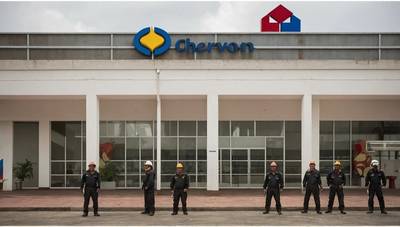Chevron and European firms lobby for the retention of stakes in Venezuelan oil joint ventures
Three sources familiar with the situation said that the U.S. oil company Chevron and several European firms are currently in discussions with the Trump Administration to get permission to retain their stakes in joint-ventures with Venezuela's PDVSA.
Washington revoked in March licenses and authorizations that it had granted to PDVSA’s foreign partners and clients in the past years, allowing them to do business in Venezuela, which was under U.S. sanction, and exporting oil to destinations such as the U.S.A., Europe, and India.
The U.S. gave companies until May 27, to close transactions. However, it did not make any specific decisions on what the companies should do with their employees, assets, and joint venture stakes in Venezuela.
Experts and lawyers have stated that more clarity is required to close these activities. PDVSA only delivers oil to customers that prepay or accept swaps. In April, it canceled several crude cargoes bound for Chevron due to payment uncertainty.
The U.S. Treasury Department allowed a license that was granted to U.S. oil services firms for the purpose of storing equipment in Venezuela to expire last week.
Sources say that several oil companies have asked the U.S. for permission to return to the license they held between 2020 and 2022. This type of licence prevented them from expanding their operations in Venezuela and exporting oil but allowed them preserve their stakes and offices in the South American country. The sources spoke under condition of anonymity as they were not authorized by the government to speak publicly.
This option would prevent an exodus from Venezuela of foreign companies. However, it could result in PDVSA accumulating more debt and owing dividends to companies as they plan to take over the operations that were previously controlled by joint ventures, and handle exports on their own.
Venezuelan oil production fell sharply over the past decade, due to a lack of investment, mismanagement, and sanctions. However, the country still has the largest reserves in the world.
Last month, Repsol CEO Josujon Imaz stated that the Spanish company is in discussions with U.S. officials about ways to maintain activities in Venezuela.
Chevron's CEO Mike Wirth stated on the company’s earnings call earlier this month that the company was in discussion with the U.S. Government on how it could modify or extend its license.
The CEOs did not disclose the specifics of their requests.
PDVSA Venezuelan Oil Ministry, and U.S. Treasury didn't respond to comments. Chevron's spokesperson referred to Wirth’s recent public remarks on the issue.
The Last U.S. Oil Company in Venezuela
Chevron, following PDVSA's cancellation of cargo last month, has taken small steps in Venezuela to reduce its operations, where it is a minority stakeholder in four joint ventures that are controlled by the state company.
PDVSA temporarily halted production at Petropiar in April to reorganize its operations and supply more feedstocks to domestic refineries. Chevron has, on the other hand, diverted tankers which were exclusively transporting Venezuelan crude for business.
About 300 contractors are linked directly and indirectly to Chevron's projects with PDVSA, which are responsible for about a quarter of Venezuela's 1-million-barrel-per-day oil output. In recent years, the company hired new employees.
Chevron is not giving up its efforts to convince the Trump administration that having a presence and exporting oil from the OPEC nation is important for U.S. security of energy.
Wirth stated in a recent television interview that "we are the only American firm left on the ground" in Venezuela. He said that if we left like others, oil production would continue and American companies would be replaced by those from other countries, including China and Russia.
Chevron owed PDVSA $3 billion, which had accumulated over the period in which the U.S. firm was not allowed to access proceeds in Venezuela. One source said that the export mechanism included in the authorization allowed Chevron to recover nearly the entire amount. However, some dividends are still pending.
The government of Nicolas Maduro has vehemently rejected U.S. Sanctions, which were hardened by Trump in response to his criticisms about the U.S.'s rigged elections, as well migration. Venezuela has called the U.S. sanctions an "economic warfare," and some of its major partners, such as China, also have similar views.
"Venezuela will not be stopped." Maduro stated on a TV show last week that Chevron is the one who suffers (with license cancellation).
Experts predict that Venezuela's oil production will decline between 15 and 30 percent by 2026, if oil licenses were revoked without alternative measures.
(source: Reuters)

